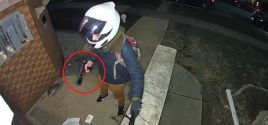Law Enforcement Looking To Create A Searchable Database Of Everywhere Your Vehicle Has Beenby Tim CushingTechdirt Oct. 25, 2012 |
Popular 
IDF Opens Fire on Syrians Protesting Israel's Expanding Occupation of South Syria

Putin Accuses 'Ethnic Jews' of Tearing Russian Orthodox Church Apart

Saudi National Rams Car Into Germans at Christmas Market in Suspected Terrorist Attack [UPDATED 2X]

Ohio Senate Passes Bill Aimed at Outlawing Criticism of Israel, Criminalizing Gospel

Nick Fuentes Targeted by Gunman at His Home After Being Doxed on Elon Musk's Twitter [UPDATED]
 Back in August, Mike wrote about some questionable sharing of license plate information between the US Border Patrol and various insurance companies. While the stated aim of tracking stolen vehicles might seem to make this sharing justified, the fact that this is going on with no oversight or accountability is cause for alarm. Of course, law enforcement has long had big plans for license plate readers (LPRs). The ACLU has come across a recording of a 2010 National Institute of Justice conference in which one of the speakers expresses an interest in building LPR data into a "Google" of license plate locations. Dale Stockton, Program Manager of the “Road Runner” project at the Automated Regional Justice Information System in San Diego spoke on a panel on license readers at the 2010 conference and explained to police and prosecutors in attendance how best to share license plate data. Mind you, he was talking about the location information of people never accused of any crime.Stockton knows this would never fly if attempted directly. He states as much in the transcript: We're probably not going to have any centralized national giant bucket of license plate reader data. It probably wouldn't stand the court of public opinion, and it's probably something that, given where we are in the rollout cycle, wouldn't easily be done, but we can develop regional sharing capability...But the "court of public opinion" can be routed around, according to Stockton. Despite frankly stating that the public would find a "Google of license plates" odious, he intends to do just that, through a series of back doors. And so doing, you get those set up and then begin to share between those regions, and as you begin to look beyond your region, utilize a trusted broker like Nlets...If Stockton has his way, a decentralized search system for license plates, routed through a third-party's software, will perform exactly the way he wants it to. Somehow he feels that a distributed system is OK while a centralized system isn't. Or rather, he feels that both systems are OK, but the public will only put up with the illusion that law enforcement isn't running a Google-esque system of harvested plate data. Is the fear of a system like this overblown? Every law enforcement official at the conference runs down several anecdotes about how the plate reading system has aided them in investigating various crimes. But should law enforcement have access to nationwide plate data, much of which pertains to citizens who have never been accused of a crime, much less committed one? Stockton tries to justify the LPR system by comparing it to officers running plates in person. One of the questions about license plate readers is this kind of hocus pocus, "you are invading my privacy; it's super intrusive." And I come from the opposite end of the spectrum. I truly believe that this technology is only doing what license plate readers have already — I'm sorry — what officers have already been doing in the field for many, many years.The biggest difference here is the "always on" aspect and the fact that everyone is tracked. "Reasonable suspicion" and the like are taken completely off the table and replaced with an indiscriminate system that harvests data. It's a handy way to peel back another layer of privacy, as Kade Crockford of the ACLU states: We've been making a lot of noise about location tracking of late. License plate readers rank high among the technologies that are threatening our privacy with respect to our travel patterns. Where we go says a lot about who we are, and law enforcement agencies nationwide are increasingly obtaining detailed information about where we go without any judicial oversight or reason to believe we are up to no good. Stockton says we have nothing to worry about with respect to license plate reader data and privacy, that that's all "hocus pocus." But he's wrong.As Crockford points out, the Department of Justice has already stated that Americans have "no privacy interest" when it comes to cellphone location information. The DOJ's rationale could easily stretch to fit this scenario. But what's "good" for the American public is rarely viewed as acceptable for those writing the guidelines or using the technology. For all the talk about "nothing to hide," officials are very touchy when it comes to making their information accessible. Data from license plate readers in Minnesota was obtained by a St. Paul car dealer using open-records laws, and used to repossess at least one car, according to a recent article in the Minneapolis Star Tribune. The article included this amusing tidbit:So, the question that needs to be asked of every politician and law enforcement member who feels this system will only be used for catching "bad guys" is whether or not they'd mind having their location tracked via license plate readers. Stockton's pushing for something he knows the public won't stand for and is using successful investigations as the ends to justify the privacy-violating means. |



